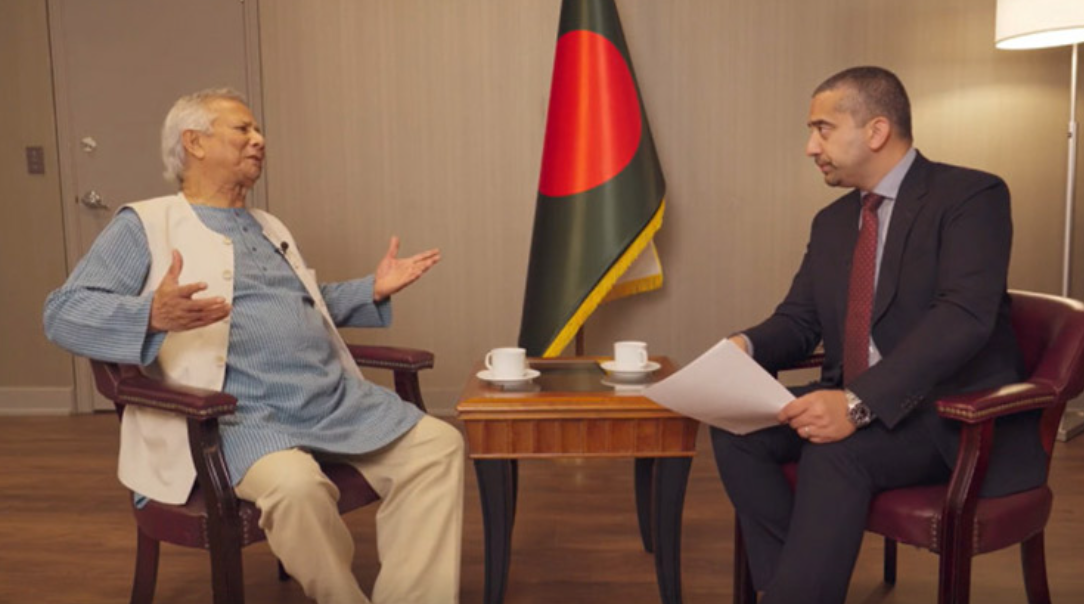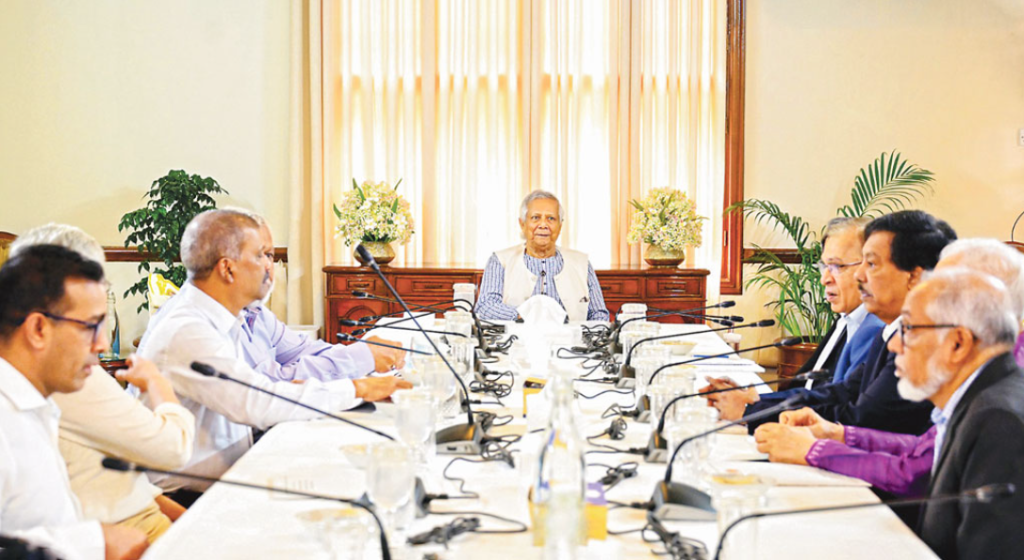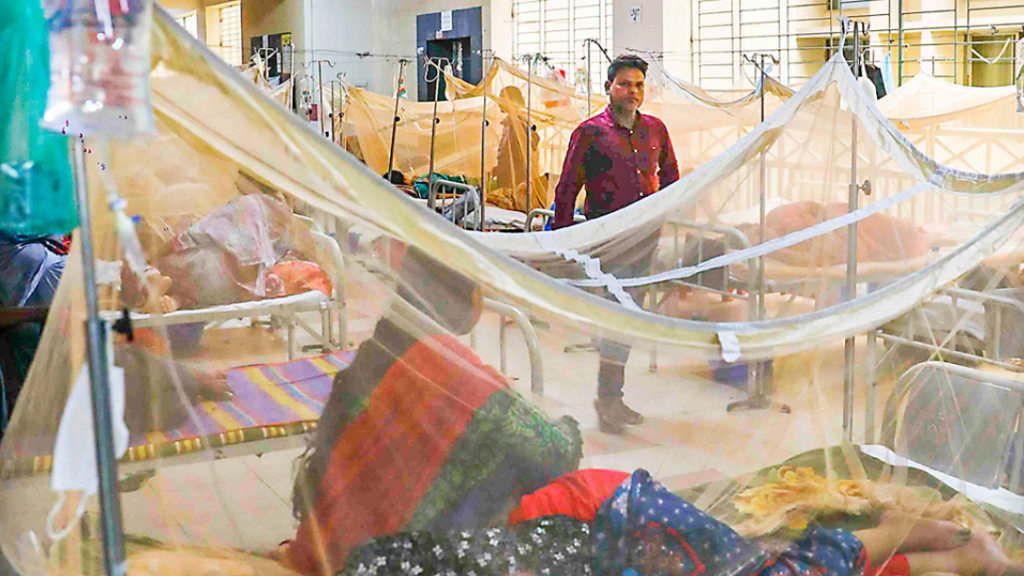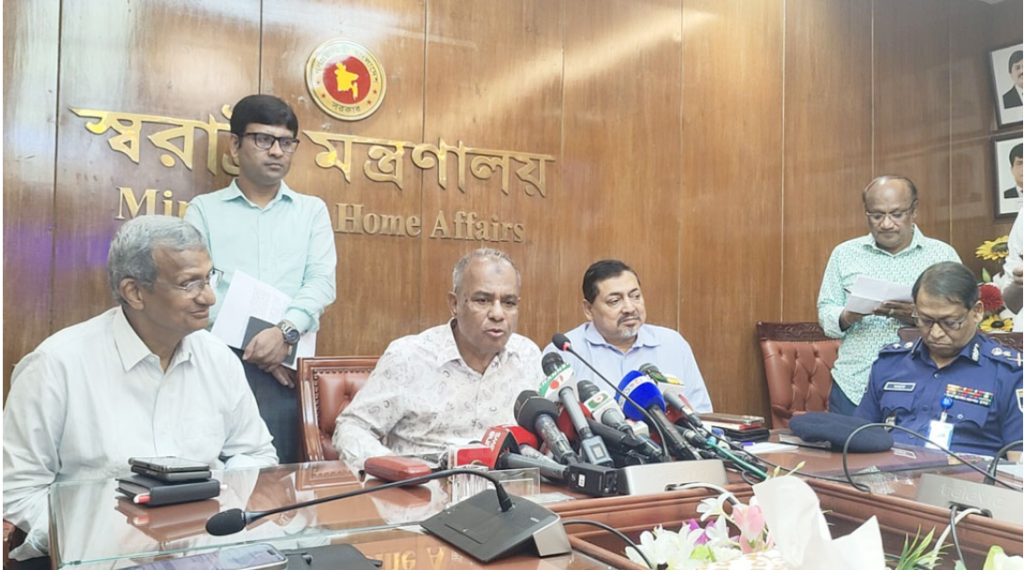Desk Report:
Mehdi Hasan: A lot has happened since you and I last spoke. I think we last spoke in 2017. You were an ordinary citizen then, a Nobel Peace Prize-winning economist, but you weren’t running a country. A little over a year ago, student protesters in Bangladesh overthrew the Awami League government and Prime Minister Sheikh Hasina fled the country. For two decades, she had been a de facto dictator in your country and had committed numerous human rights violations. Many were happy to see her go. What was your initial reaction to the fall of her government? What are your memories of that day, that night? How did you feel that night? Fear, hope, or surprise?
Dr. Yunus: Excitement. Excitement. Excitement, yes of course. Finally it happened. It was great news!
Mehdi Hasan: Did you think it would happen?
Dr. Yunus: No, it was completely unexpected. There were some protests going on, which are common in Bangladesh. But I didn’t think that something would happen that would change the country. The situation in the country was very bad then. I didn’t know the details of what happened before he left, but the final news that he was gone was very exciting.
Mehdi Hasan: How has the reaction been in the Bangladeshi people over the past year? You recently completed a year of the revolution. What is the mood in the country now? Is there still optimism, excitement, hope, or is there disappointment at the slow pace of change?
Dr. Yunus: A mixture of everything. There is excitement that something is happening, and then there is disappointment. The disappointment is because people like to complain about the results. It’s normal. They want more. The expectation level is so high that they want everything now, not tomorrow. So, since it’s not happening today, you’re no good—that kind of idea. But there is a good sign. It’s not going in any negative direction. It’s just the result of high expectations.
Mehdi Hasan: After Hasina fled, the student protesters chose you to lead the interim government of Bangladesh. Were you surprised by this decision? Why do you think they chose you—a non-politician, an economist, and, with all due respect, an 80-something man—to be the head of this caretaker government, the chief advisor?
Dr. Yunus: I was surprised, because I don’t know them. I’ve never met them. I’ve never had any conversations with them. Oh, great! The message first came through my colleagues in my institution that students were trying to contact you. They wanted you to take charge. I said, ignore them. Don’t get involved in this discussion. I was trying to convince them that it wasn’t going to happen. The next day, they themselves tried to come to me directly, because talking to my colleagues wasn’t working. So they called me, explained. I said, ‘No, find someone else. I don’t want to get involved.’ This discussion, the conversation—went on for three days. I was trying to stay away. And they were asking me again and again.
Mehdi Hasan: So what made you agree in the end?
Dr. Yunus: Finally, they explained the situation. Look, students have given blood, sacrificed themselves, children have been shot. And so much has happened, and they want you to come. What will happen to the country if you ignore all this? They were very emotional. They were trying to convince me. Finally I said, okay, if you are making such a big sacrifice, then I will change my mind. I will see what I can do for you.
Mehdi Hasan: You mentioned this sacrifice and bloodshed. In February, the United Nations reported that an estimated 1,400 people were killed during Hasina’s crackdown on student protests last summer. Bangladesh has now formally charged her with crimes against humanity. And you know better than I do that she is now in India, where she has sought refuge under the protection of Prime Minister Narendra Modi. You have repeatedly requested that he be brought back to Bangladesh and held accountable. What is your reaction to Modi ignoring your call? Do you think India will ever hand over Hasina to Bangladesh?
Dr. Yunus: If left to their own devices, that is, if they can make their own decisions, then they will probably keep her. If there is a legal obligation that they cannot avoid, then the situation will be different.
Mehdi Hasan: What is India’s interest in keeping her?
Dr. Yunus: They have always supported her. They still hope, perhaps those who support her, hope that she will return to Bangladesh as a victorious leader with full glory.
Mehdi Hasan: The New York Times reported that she is holding a virtual meeting with the Awami League. Does that worry you that India will try to bring her back and put her back in power?
Dr. Yunus: I won’t use those exact words, but it is possible that some external force will help her return to Bangladesh. We are always concerned about this, because—
Mehdi Hasan: Have you spoken to Modi?
Dr. Yunus: I spoke to Modi. Very openly.
Mehdi Hasan: What did he say about sending him back to face trial?
Dr. Yunus: Two things. First, I told them that you want to keep him. I can’t tell you what to do with him, but make sure he doesn’t talk about us. Make sure he doesn’t talk about the people of Bangladesh over and over again.
Mehdi Hasan: Sorry, did Modi tell you this?
Dr. Yunus: I told Modi about this, please make sure…
Mehdi Hasan: What did he say?
Dr. Yunus: He said, ‘I can’t control social media.’
Mehdi Hasan: Since Hasina was ousted, your government has banned her party, the Awami League, deregistered it, effectively barring it from participating in the next elections. Your fellow Nobel laureate Amartya Sen, whom you know very well, warned against banning the League. He said that this would only be a repetition of the mistakes of the previous government, which banned the opposition after coming to power. You are just repeating that cycle. What do you have to say in response to this criticism by Amartya Sen and others?
Dr. Yunus: This is a wrong criticism, because we have not banned the Awami League.
Mehdi Hasan: I mean, have you cancelled their registration?
Dr. Yunus: No, not registration. Only their political activities have been suspended.
Mehdi Hasan: What does this mean?
Dr. Yunus: It means they cannot do any political activities.
Mehdi Hasan: So you are practically… I mean, they cannot contest elections.
Dr. Yunus: No, the party still exists.
Mehdi Hasan: Can they contest elections?
Dr. Yunus: Not now, because the activities are banned.
Mehdi Hasan: Okay, so how is this different from the (previous government) warning about the recurrence?
Dr. Yunus: They are legal as a party. But for now their activities are suspended. I mean, it can be reopened at any time.
Mehdi Hasan: You mean you can allow the suspended activities to resume?
Dr. Yunus: There is a possibility that the suspension can be lifted.
Mehdi Hasan: You did not ban the party. You just said that for now they will not be able to participate in the elections.
Dr. Yunus: Exactly.
Mehdi Hasan: But how can it be democratic to prevent a group from participating in the elections?
Dr. Yunus: This is what the Election Commission has decided, having seen the functioning of this party and considering the possibility that they will disrupt the entire election process. So they thought it would be better not to—
Mehdi Hasan: But you certainly cannot deny that they have millions of supporters in Bangladesh.
Dr. Yunus: I won’t say millions. They have supporters, but I don’t know how many are left, because the supporters are because you are so powerful, that’s why I always go to you, because you are powerful. You may not even be a supporter.
Mehdi Hasan: But you are not denying that they have a constituency in Bangladesh. They have no support?
Dr. Yunus: Sure. It is a matter of long term.
Mehdi Hasan: But now those people have no voice. You have banned their party. I am saying, you are preventing their party from participating in politics.
Dr. Yunus: They can vote. As voters, they are legitimate voters. Many people participate.
There is a government. They will choose their own leader…
Mehdi Hasan: But is it helpful for Bangladesh that people say, ‘The new government is oppressing the old government, the cycle continues?’
Dr. Yunus: Otherwise we will not be able to hold elections. This party, even if they are a political party, they are not behaving like a political party. They have killed people—they have not expressed any remorse for that. They have not taken any responsibility for what they have done during this period. Not a single word. They are always complaining that someone else is responsible for it.
Mehdi Hasan: I want to come back to the election later, but before that I want to talk about some criticism that has come from outside Bangladesh. I want to give you a chance to respond to that. Last November, about 30,000 Hindus gathered in Bangladesh to protest against your government, claiming that thousands of attacks have been carried out on their community. Donald Trump also commented on this and called the violence in Bangladesh ‘barbaric’, I think he used that word. What will it take to bring this violence under control, or do you think it is under control? We can talk about the extent of it.
Dr. Yunus: First of all, this is fake news. You cannot act on this fake news.
Mehdi Hasan: I quoted Donald Trump, and you say it is fake news.
Dr. Yunus: Yes. Did Donald Trump ever say anything like that, or does he have any knowledge of what is happening in Bangladesh right now?
Mehdi Hasan: You are saying that it is not only exaggerated, but that there has been no violence against them? Even the New York Times recently reported several incidents of vandalism, gang violence, and last November, the arrest of a Hindu monk by the police for hoisting a Hindutva flag over the national flag of Bangladesh.
Dr. Yunus: That is not correct, there is a lot of fake and false news.
Mehdi Hasan: No, I understand. All kinds of news come. I understand, it is exaggerated. But I want to know, are you saying that there is no anti-Hindu violence?
Dr. Yunus: That is not correct.




